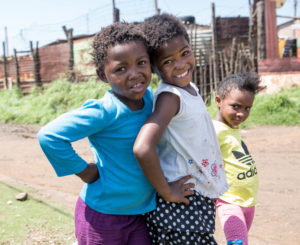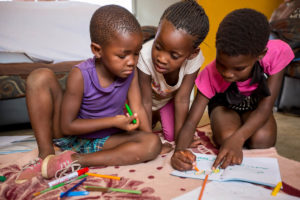Leaving no Child Behind
By Fiona Burtt, Senior Technical Advisor, ECD/OVC at mothers2mothers

Today is the International Day of the African Child and this year’s theme to “Leave No Child Behind for Africa’s Development” could not be more fitting. The state of every society rests on how it treats its youngest and most vulnerable members, and the people who care for them. For African countries to move forward with development, it is vital that there is an increased commitment to supporting the health and developmental needs of all young children.
At mothers2mothers (m2m), we have increasingly focused on ensuring that HIV-exposed and other vulnerable infants and children not only survive but thrive. With the support of fantastic funders, we have expanded our interventions beyond health to address a wider range of issues, including early childhood development (ECD), as we know that the period from pregnancy to age three is critical to a child’s development.
 As m2m’s ECD and vulnerable children specialist, my role is to champion children and ways in which we can prioritise their needs: both within m2m and externally. I work closely with our country teams, to develop high-quality and effective child-focused services that align with local, national, and global priorities. Many of our Mentor Mothers support parents and caregivers to understand the importance of nurturing their children’s development, in conditions that promote health, nutrition, security, and safety, responsive caregiving, and opportunities for early learning. In Malawi, for example, we are deepening our approach with the support of the Conrad N. Hilton Foundation to ensure not only that m2m is promoting ECD wherever we work, but that the health system is infused with ECD understanding to become increasingly child-friendly.
As m2m’s ECD and vulnerable children specialist, my role is to champion children and ways in which we can prioritise their needs: both within m2m and externally. I work closely with our country teams, to develop high-quality and effective child-focused services that align with local, national, and global priorities. Many of our Mentor Mothers support parents and caregivers to understand the importance of nurturing their children’s development, in conditions that promote health, nutrition, security, and safety, responsive caregiving, and opportunities for early learning. In Malawi, for example, we are deepening our approach with the support of the Conrad N. Hilton Foundation to ensure not only that m2m is promoting ECD wherever we work, but that the health system is infused with ECD understanding to become increasingly child-friendly.
There is still so much to do. Almost 250 million children in low- and middle-income countries are at risk of not attaining their full development potential. In Eastern and Southern Africa, more than 200 children are still infected with HIV every day and without treatment, half of all children born with HIV will die by the age of two.
But there is currently a significant window of opportunity to motivate for change. Last month saw the launch of the world’s first framework for global action and results in ECD. Nurturing Care for Early Childhood Development, launched by the World Health Organization, UNICEF, the World Bank, and the Partnership for Maternal, Newborn & Child Health draws upon the latest evidence to emphasise that ECD should be a non-negotiable priority for every society. It makes it abundantly clear that, without appropriate policies and practices, particularly in low- and middle-income countries, human potential will not be transformed.

In Africa, this is a call for action for not only governments, but for all of us working to improve the lives of children, mothers, and families. As the Nurturing Care Framework highlights, only by establishing strong partnerships between government, civil society, and communities will it be possible to make real progress. At m2m, this is something we have long understood and prioritised, endeavouring to work closely with government and other partners, to build an enabling environment for the development of the youngest children.
Not just today, but 365 days a year, we at m2m will continue to work for the health, wellbeing, and positive development of all young children in our care. And my enthusiastic hope is that the current global interest in ECD will translate into a new wave of funding that will enable m2m and other partners to help really ensure that no child is left behind!






















